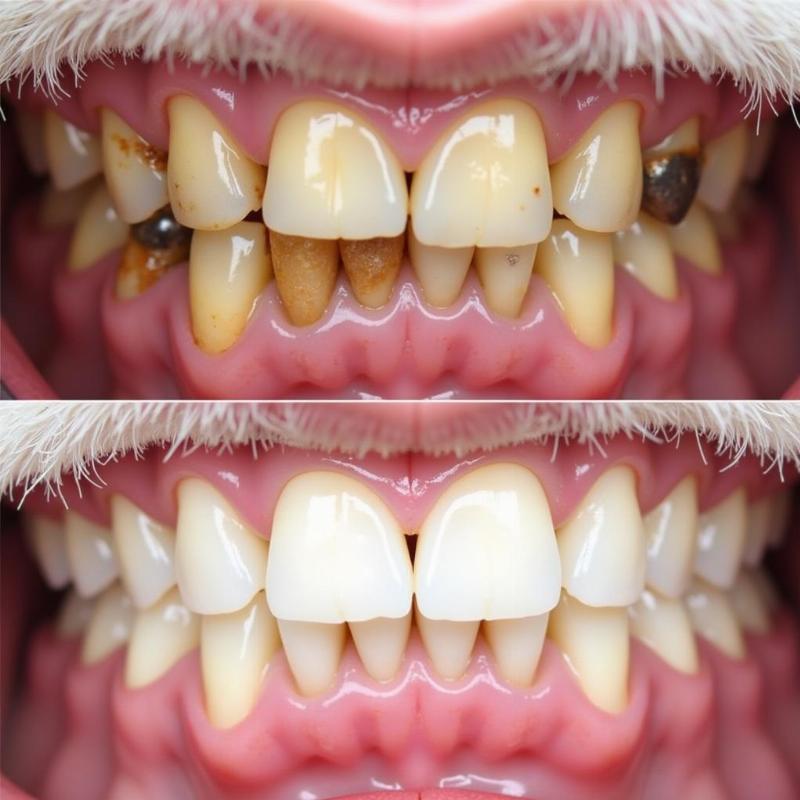If your dog’s teeth are yellow, you’re not alone. Many dog owners notice discoloration at some point in their furry friend’s life. While pearly white teeth might seem ideal, yellowing can be a natural part of aging or indicate underlying dental issues. Understanding the causes of yellow teeth in dogs and knowing the right solutions can help you maintain your dog’s oral health and overall well-being. This article will explore the common reasons for yellowing, offer preventative measures, and guide you on when to seek professional veterinary care.
Why Are My Dog’s Teeth Yellow?
Several factors contribute to yellowing teeth in dogs. Age plays a significant role. Just like humans, dogs’ teeth can naturally yellow as the enamel wears down, exposing the underlying dentin, which is naturally yellowish. However, yellowing can also be a sign of plaque and tartar buildup. Plaque, a sticky film containing bacteria, can harden into tartar, a hard, yellowish-brown deposit that adheres to the teeth and can lead to gum disease. Certain diets and medications can also contribute to staining.
 Dog's Yellow Teeth Causes
Dog's Yellow Teeth Causes
Preventing Yellow Teeth in Dogs
Preventing yellow teeth starts with good oral hygiene practices. Regular brushing is crucial. Aim to brush your dog’s teeth daily using a dog-specific toothbrush and toothpaste. Never use human toothpaste, as it can be toxic to dogs. Providing dental chews and toys can also help scrape away plaque and tartar. A balanced diet, avoiding sugary treats and sticky foods, can also contribute to better oral health.
When to See a Vet About Your Dog’s Yellow Teeth
While some yellowing is normal, it’s essential to know when to seek professional help. If you notice excessive tartar buildup, red or swollen gums, bad breath, or if your dog seems to be experiencing pain while eating, it’s time to schedule a visit to your veterinarian. They can perform a thorough dental examination, clean your dog’s teeth professionally, and address any underlying dental issues.
Home Remedies for Dog’s Yellow Teeth
While professional cleaning is the most effective way to remove tartar, some home remedies can help maintain your dog’s oral hygiene between cleanings. Adding dental additives to your dog’s water, or offering dental treats, can help reduce plaque and freshen breath. You can also try gently wiping your dog’s teeth with a damp cloth or gauze. However, these methods should not replace regular brushing and professional veterinary care. Always consult with your veterinarian before trying any new home remedies.
My Dog Hates Having His Teeth Brushed, What Can I Do?
Many dogs resist having their teeth brushed, but it’s a crucial part of their oral care. Start slowly, introducing the toothbrush and toothpaste gradually. Use positive reinforcement, rewarding your dog with treats and praise. Make the experience as positive as possible. You can also try using finger brushes or dental wipes as an alternative to a traditional toothbrush. If you’re still struggling, consult with your veterinarian or a professional dog trainer for personalized advice.
Conclusion
Yellow teeth in dogs can be a natural part of aging, but they can also signify underlying dental issues. By understanding the causes of yellowing, implementing preventative measures like regular brushing and a healthy diet, and seeking professional veterinary care when needed, you can ensure your dog maintains a healthy smile and overall well-being. Don’t ignore those yellow teeth – they’re a window into your dog’s oral health.
FAQ
- Can I use human toothpaste on my dog? No, human toothpaste contains ingredients that are toxic to dogs, such as xylitol. Always use dog-specific toothpaste.
- How often should I brush my dog’s teeth? Ideally, you should brush your dog’s teeth daily.
- What are signs of dental disease in dogs? Bad breath, red or swollen gums, excessive drooling, difficulty eating, and pawing at the mouth are all potential signs of dental disease.
- Are dental chews effective? Dental chews can help reduce plaque and tartar buildup, but they shouldn’t replace regular brushing.
- How much does a professional dog teeth cleaning cost? The cost of a professional dog teeth cleaning can vary depending on your location and the specific needs of your dog. Contact your local veterinarian for an estimate.
- Is anesthesia always required for professional cleaning? Yes, general anesthesia is typically required for a thorough and safe professional dental cleaning.
- Can yellow teeth in dogs be reversed? While some staining can be improved with regular cleaning, the natural yellowing from dentin exposure cannot be reversed.
my dog ate bubble gum
how can i tell how old my rescue dog is
best way to remove tartar from dog teeth
how to tell if dogs teeth hurt
Beautdogs.us is your premier resource for all things dog-related in the United States. We offer expert advice on dog breeds, grooming, nutrition, training, and health, providing a comprehensive guide for both novice and experienced dog owners. Whether you’re looking for product recommendations or breed-specific information, Beautdogs.us is your trusted source for all your canine needs. Contact us today via email at [email protected] or phone at +1 501-555-7529.